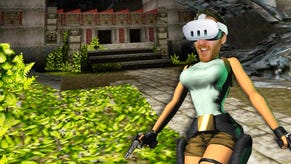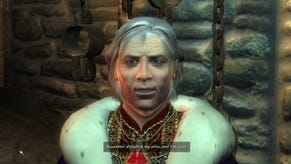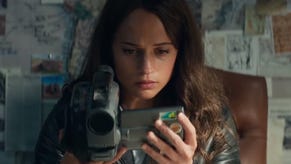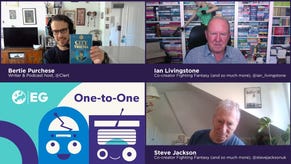Rewriting Tomb Raider
Rhianna Pratchett on the rape controversy, giving Lara a new voice and why it's time for games to grow up.
"Personally, I could do with less of it," says Rhianna Pratchett. "I'm not sure what the thinking behind having quite so much is."
She's talking about the shrieking. Over the course of the three-minute trailer for the new Tomb Raider, Lara Croft shrieks, screams, grunts, yelps and sobs 23 times. And that's not even counting the panting. As the demo on show at this year's Eurogamer Expo showed, New Lara can't walk down a level path without wheezing. The phrase "torture porn" was bandied around when the trailer was released, but the game is more like porn for people who get turned on by asthma.
Pratchett has previous experience of giving strong female game characters a voice, having worked on the scripts for Mirror's Edge and Heavenly Sword. Now she is the lead writer on the Tomb Raider reboot due for release in March. But although she is responsible for the words that come out of Lara's mouth, Pratchett has little control over the other noises.
"It's not my area. I don't have much of a say in that," she says, before pointing out that the demo showcases the start of the game. "I think it lessens as she goes on and gets tougher."
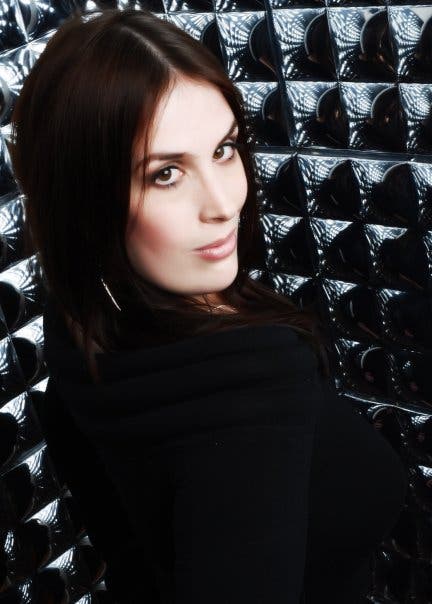
The Square Enix representative sitting in on our interview says it's all the work of a real actor, recorded while she was performing strenuous physical activities. But yes, she says, the team has received feedback that it might be "a bit much".
"From a gamer's perspective, I can understand why people feel like that," Pratchett says. "I hope they do something about it. This sounds terrible, but it's not my jurisdiction. All I can say is how I feel."
At least she can do that these days. Back in June, when the big Tomb Raider row blew up, Pratchett's appointment had yet to be announced. Bound by a non-disclosure agreement, she was unable to defend her work.
"When you're looking at The Sun running headlines like 'Lara Croft in Island Rape Hell', and you can't stick your hand up and say, 'It's not like that, you need to see it in context...' That was a shame," she says. "Now I'm getting a chance to say no, actually, there are lots of things happening in that scene."
The controversy began with the trailer, which shows a man pinning Lara against a wall and groping her. It was fuelled by executive producer Ron Rosenberg, who said characters in the game try to rape Lara and talked about players wanting to "protect her".
"It was very unfortunate things got said the way they did. I wasn't happy about it," says Pratchett. "It took away from what we were really doing with that scene."
In fact, she explains, "The scene is very much about what it means to take a human life. It's about Lara's reactions, rather than the guy's actions - which are absolutely what you see in the trailer, and never go further than that."
"She's not thinking, 'Oh my God, I was almost raped.' She's thinking, 'Oh my God, I've just taken a human life.'"
In the game, Lara knees the guy in the balls, escapes from her restraints and begins battling him for control of the gun. If she loses, she dies. If she wins, she kills the man and is shown dealing with the emotional consequences of that act.
"One of the problems with the trailer is that it cut out Lara's reactions," says Pratchett. "When you see the scene in context, you see the light leave the guy's eyes and it's a big f***ing deal for Lara. She just can't believe what she's done.
"She's not thinking, 'Oh my God, I was almost raped.' She's thinking, 'Oh my God, I've just taken a human life.' It's unfortunate that if you have a female protagonist and male antagonists, and they're coming after her, people see that vibe."
But that's the problem - would that scene even exist if all the characters were male? Pratchett points to Mafia 2, which features a male-on-male attempted rape scene. Again, she says, it's about context.
"[Narrative designer] John Stafford and I talk about how this character is so psychotic, he would do that to a young male," says Pratchett. "We're talking about a community on that island which is solely male, for reasons you find out during the game. It felt very right that this character would try those sorts of things. He is trying to terrify Lara as much as anything else.
"It's very honest for those characters at that moment. It's not prolonged, it's not done for titillation. It's uncomfortable because it should be uncomfortable... If I felt that a female character needed sexual assault or rape as part of their backstory, it would be in there fully. Not as something you might see on Eastenders of a weeknight."
"I know people are concerned we're making her weaker, but you don't plop out as a badass. It's something that builds up."
According to Pratchett, the sexual assault is "absolutely not" a character-defining moment for Lara, and the trailer is not representative of the game's story arc - "But I'm not sure it was ever intended to be." Most of the footage was taken from the game's first act, she explains. As the game progresses, Lara begins to transform into the strong, capable character her fans are familiar with.
"I know people are concerned we're making her weaker, but you don't plop out as a badass," Pratchett says. "It's something that builds up. We wanted to tell that origins story because we felt it's a powerful experience, and one that isn't really explored in games.
"It can be a little jarring, seeing her crying and being vulnerable, because we haven't seen this Lara before. We're taking a risk, making her appear scared and doubt herself, but that's where bravery comes from. You can't have bravery without fear. And fear is a dangerous thing to show in games, because we're so used to capable characters who can do everything."
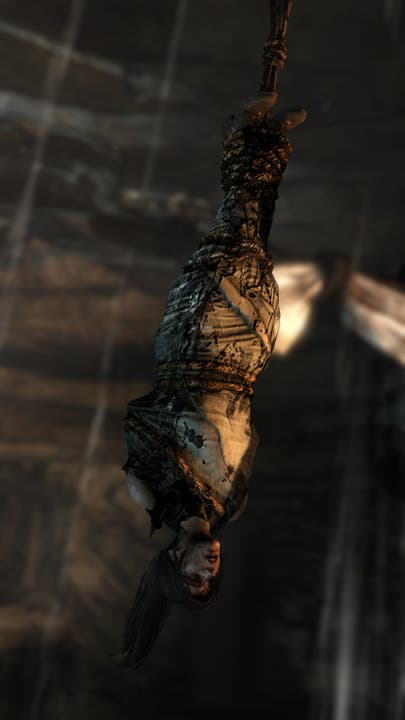
According to Pratchett, this is not a gender issue. "Male characters are often undercooked. We probably suffer from the fact we don't think about them as being human - they're heroic and there's not much else to them. That is a problem."
But there is another factor at play here. For over a decade Lara Croft has been gaming's flagship female icon, and by flagship I mean only. (Nitpickers might point to Samus or Al Vance but really, does your Mum know who they are?) It's great that games are becoming mature enough to feature both round and flat characters. But as Pratchett says, there are reams of innately tough male heroes out there. Can't one of them lead the charge? Must this task really fall to the only person with tits?
In Pratchett's defence, she's not working on the script for a game with an iconic male protagonist. She's working on Tomb Raider. Listening to her talk, it's clear that her agenda has nothing to do with gender. She's simply trying to make a familiar character more complex, more interesting and more believable.
"Over the years, as Lara became more capable and more like a female Batman, I felt her humanity had been lost," she says. "'Teflon Lara' was the term the development team used. Nothing touched her, nothing stuck to her.
"We wanted to go back to a time when she was more vulnerable. Not because she was female, but because she was human, and vulnerable in the way any 21 year-old would be in that situation. She's at an age where she thinks she knows herself, but she doesn't really. Throughout the game, we're drawing out the strength within that she doesn't realise is there."
For Pratchett, the key to making Lara multi-dimensional is showing her human interactions. "This game is quite character-heavy compared to previous Tomb Raiders," she says. "There's a core group of characters, all of different ages, backgrounds and opinions, and all of whom have different relationships with Lara. It was important to get those characters in there as sounding boards."
This is another bold decision on Pratchett's part. The best Tomb Raider games have are those in which Lara's interaction with others is kept to a minimum. (Evidence for the prosecution: Angel of Darkness, which co-starred a man with inexplicable hair called Kurtis Trent. The most interesting thing about him was the fact he smoked.)
But fans needn't worry, says Pratchett: "We still have those typical Tomb Raider moments where it's just you and some beautiful vista. We wanted to get that balance between Lara interacting with other characters and also those epic moments."
"You have to make choices, as creatives, about what aspects you think are most important. You will never please everyone. Better to be true to that choice and that vision."
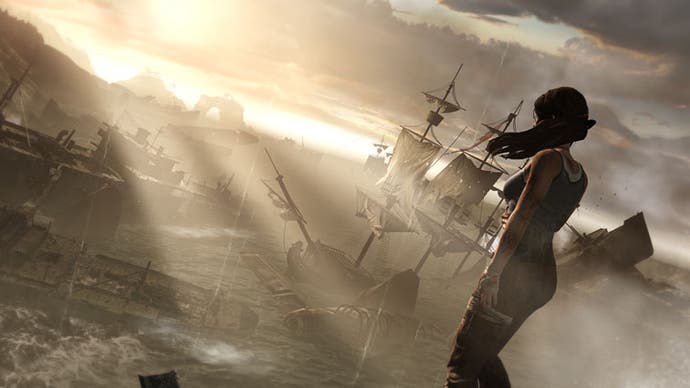
A similar approach was taken when it came to determining how linear the player's route through the game should be. There is always a critical path, Pratchett explains, but there is also a secondary storyline to uncover by following environmental clues.
"Ken Levine has talked about BioShock's narrative, and the different stages of the narrative depending on the type of player you're dealing with. It's very much the same with Tomb Raider," she says. "There's the core narrative, then there are things to learn about the world for players who like to poke into every corner and turn over every rock.
"That layered storytelling helps to appeal to a wider section of players, not just the ones who want pure action. We're trying to cater to those who love to explore a world, too."
But as Pratchett acknowledges, there will always be critics. "It's all about choice," she says. "You have to make choices, as creatives, about what aspects you think are most important. You will never please everyone. Better to be true to that choice and that vision."
There's no doubt Pratchett has made some bold choices when it comes to this Tomb Raider reboot. It is a shame that the interesting aspects of what she's trying to do were drowned out by all the noise surrounding the infamous trailer. Having played through the scene in question myself, I can see Square Enix's side of the argument. Pratchett hasn't written anything designed to arouse the viewer or demean the character. As she says, it's all about context.
But it wasn't the critics who took that moment out of context. It was the people who made the trailer. They felt the best way to sell this game was to show its heroine being chased, grabbed, groped, tied up, terrified, and begging a man to come and help her. Having talked to Rhianna Pratchett, I don't think that's what the new Tomb Raider is all about. But that just makes me more concerned about the way it's being sold.





